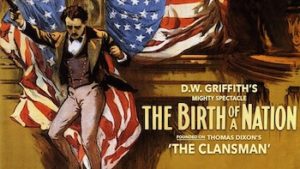
*On this date in 1915, the film The Birth of a Nation was released. Originally called The Clansman, it was an American silent epic drama film directed and co-produced by D. W. Griffith and starring white-American actress Lillian Gish.
The screenplay is adapted from the novel and play The Clansman by Thomas Dixon Jr. Griffith co-wrote the script with Frank E. Woods and co-produced the film with Harry Aitken. The Birth of a Nation is a landmark in film history. It was the first 12-reel film ever made and, at three hours, also the longest up to that point. Its plot is part fiction and part history. It chronicles the assassination of Abraham Lincoln by John Wilkes Booth and the families' relationship in the American Civil War and Reconstruction eras for several years. As a film, the pro-Union (Northern) Stonemans and the pro-Confederacy (Southern) Camerons were by far the most complex of any movie made at the time.
It was initially shown in two parts, separated by another movie innovation, an intermission, and it was the first to have a musical score for an orchestra. It pioneered close-ups, fade-outs, and a carefully staged battle sequence with hundreds of extras (another first) made to look like thousands. It came with a 13-page "Souvenir Program."It was the first American motion picture to be screened in the White House, and it was viewed there by President Woodrow Wilson. The film was racially controversial even before its release and has remained so ever since; it has been called "the most controversial film ever made in the United States." Lincoln, whom Dixon saw as a Southerner, was portrayed positively, unusual in a "Lost Cause" environment. However, the film portrayed Blacks (many played by white actors in blackface) as unintelligent and sexually aggressive towards white women and presented the Ku Klux Klan (KKK) as a heroic force.
There were widespread Black protests against The Birth of a Nation, such as in Boston, while thousands of white Bostonians flocked to see the film. The NAACP spearheaded an unsuccessful campaign to ban the movie. Griffith's indignation at efforts to censor or prohibit the film motivated him to produce Intolerance the following year. Birth of a Nation was a huge commercial success and became highly influential. The film's release has also been acknowledged as an inspiration for the rebirth of the Ku Klux Klan only months later. In 1992, the Library of Congress deemed the film "culturally, historically, or aesthetically significant" and selected it for preservation in the National Film Registry.